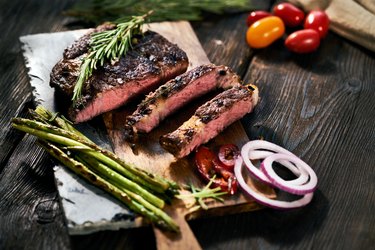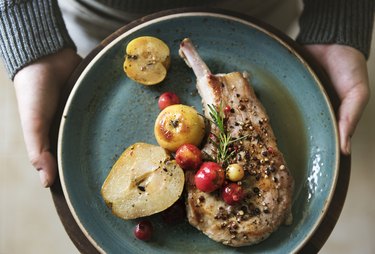Arginine (aka L-arginine) is a nutrient you may see touted on pre-workout formulas and other sports supplements. However, it isn't just for bodybuilders or athletes.
L-arginine is a conditional amino acid, meaning your body is able to produce it on its own but you need more of it during times of illness and stress, according to the U.S. National Library of Medicine. Arginine benefits your health in various ways: Importantly, it helps your body build protein, per the Mayo Clinic.
Video of the Day
Video of the Day
It is also sometimes used orally and topically as a supplement. It can even be administered intravenously (some research has shown L-arginine infusions may lower blood pressure in people with hypertension). Some take L-arginine to treat heart conditions and erectile dysfunction because it acts as a vasodilator, meaning it opens blood vessels. However, you should always speak to your doctor before starting new supplements.
Avoid taking arginine supplements if you've had cold sores or genital herpes, as too much of the amino acid may potentially trigger the virus that leads to those conditions, per the Mayo Clinic. If you get cold sores, it may be best to eat fewer foods high in arginine and more foods high in lysine, another amino acid, per the USDA.
Otherwise, if you are looking for natural sources of it, foods high in l-arginine vary widely and include fish, poultry, soy, red meat, beans, dairy and whole grains. The amino acid is less abundant in foods like fruits, eggs, popcorn, chia seeds and coffee.
To increase your intake of this amino acid naturally, enjoy these arginine foods.
How Much Arginine Do You Need?
Your body typically makes all the arginine it needs, so there isn’t a recommended daily value. If you’re interested in taking an arginine supplement or increasing the amount in your diet, speak to your doctor.
1. Steak: 1,954 mg

Skirt steak contains 1,954 milligrams of arginine per 3 ounces cooked. It also provides 24 grams of protein. You'll want to keep an eye out for its saturated fat, though: Skirt steak contains 5.2 grams (26 percent of the DV) per 3 ounces. The 2020-2025 Dietary Guidelines for Americans recommend limiting saturated fat to less than 10 percent of total calories per day.
Although occasionally enjoying foods like skirt steak for their nutrients like arginine is OK, try to limit your red meat to one to two servings per week, per the Cleveland Clinic. If you have heart disease or high cholesterol, limit it to one serving or less per week.
2. Turkey: 1,953 mg
Fat-free ground turkey provides 1,953 milligrams of arginine per 3 ounces cooked. It also offers 27 grams of protein, 25 percent of the DV for vitamin B12 and 17 percent of the DV for zinc.
Since arginine is common in protein-rich foods, it's often found in tandem with vitamin B12 — which is naturally found in animal products like meat. Vitamin B12 helps to maintain the health of your blood and nerve cells, plus it plays a role in producing DNA, per the National Institutes of Health (NIH).
3. Chicken: 1,843 mg
A 3-ounce cooked chicken breast contains 1,843 milligrams of arginine as well as 27 grams of protein. It is also a good source of vitamin B12. Try the bird in these delicious air fryer chicken recipes.
4. Tofu: 1,725 mg
Firm tofu has 1,725 milligrams of arginine per ½ cup, plus 22 grams of protein and 66 percent of your DV for calcium. It's an excellent source of lean protein, whether or not you're vegetarian.
Tofu also contains 65 percent of your DV for manganese. This trace mineral has several functions, including helping the body form connective tissue and bones, aiding in calcium absorption and fighting free radicals that may play a role in aging, per Mount Sinai.
Try it in these high-protein tofu recipes.
5. Pork Chops: 1,698 mg

Lean pork chops offer 1,698 milligrams of arginine per 3 ounces cooked. They also contain 26.5 grams of protein and 23 percent of the DV for vitamin B12 — and 2 grams of saturated fat (10 percent of the DV).
6. Soybeans: 1,428 mg
The foods highest in arginine aren't necessarily all meat or other animal products. Dry-roasted soybeans are rich in arginine, with 1,428 milligrams per 1/2 cup.
Overall, these legumes are a great source of protein (which is made up of amino acids). You'll get 20 grams per 1/2 cup, along with 4 grams of heart-healthy fiber and 25 percent of the daily value (DV) for magnesium.
7. Tuna: 1,420 mg
You'll get 1,420 milligrams of arginine in 3 ounces of cooked yellowfin tuna.
This is a healthy option if you're trying to fit in more arginine without overeating red meat: Replacing processed or high-fat meats could help lower your intake of saturated fat and sodium, which are often eaten in excess, per the Dietary Guidelines for Americans.
8. Tilapia: 1,352 mg
Tilapia contains 1,352 milligrams of arginine per 3 ounces cooked. It also provides 22 grams of protein, with just 109 calories and 0.8 grams of saturated fat.
Like tuna, tilapia is a great replacement for red or processed meat if you want to lower your intake of saturated fat and sodium.
9. Tempeh: 1,065 mg

Tempeh contains 1,065 milligrams of arginine per 3 ounces. This vegetarian staple (made with soybeans) is one of many healthy foods high in arginine. It also provides 17 grams of protein and 53 percent of your DV for copper. Essential for good health, copper helps your body maintain your nervous and immune systems, per the NIH.
Try it in these tempeh recipes for weight loss.
10. Peanuts: 804 mg
Dry-roasted peanuts have 804 milligrams of arginine per ounce, which is about a handful. They also have nearly 7 grams of protein and just 167 calories.
Peanuts are also a great source of healthy fats, with 7.4 grams of monounsaturated fat and 2.7 grams of polyunsaturated fat per serving. Unsaturated fats like these are considered healthy because they can improve blood cholesterol levels, stabilize heart rhythms and ease inflammation, per the Harvard T.H. Chan School of Public Health.
Foods High in Arginine
Food | Serving Size | Arginine Content |
|---|---|---|
Steak | 3 oz. | 1,954 mg |
Turkey | 3 oz. | 1,953 mg |
Chicken | 3 oz. | 1,843 mg |
Tofu | 1/2 cup | 1,725 mg |
Pork Chops | 3 oz. | 1,698 mg |
Soybeans | 1/2 cup | 1,428 mg |
Tuna | 3 oz. | 1,420 mg |
Tilapia | 3 oz. | 1,352 mg |
Tempeh | 3 oz. | 1,065 mg |
Peanuts | 1 oz. | 804 mg |
- Mayo Clinic: "L-arginine"
- MyFoodData: "Dry-Roasted Soybeans"
- MyFoodData: "Skirt Steak"
- U.S. Department of Agriculture: "2020-2025 Dietary Guidelines for Americans"
- Cleveland Clinic: "Is Red Meat Bad for You?"
- MyFoodData: "Fat Free Ground Turkey"
- National Institutes of Health: "Vitamin B12"
- MyFoodData: "Firm Tofu"
- Mount Sinai: "Manganese"
- MyFoodData: "Pork Chops (Lean)"
- MyFoodData: "Roasted Chicken Leg"
- MyFoodData: "Cooked Yellowfin Tuna"
- MyFoodData: "Cooked Tilapia"
- MyFoodData: "Tempeh"
- National Institutes of Health: "Copper"
- MyFoodData: "Dry Roasted Peanuts"
- Harvard T.H. Chan School of Public Health: "Types of Fat"
- Drugs.com: Arginine
- WebMD: Arginine - Heart Benefits and Side Effects